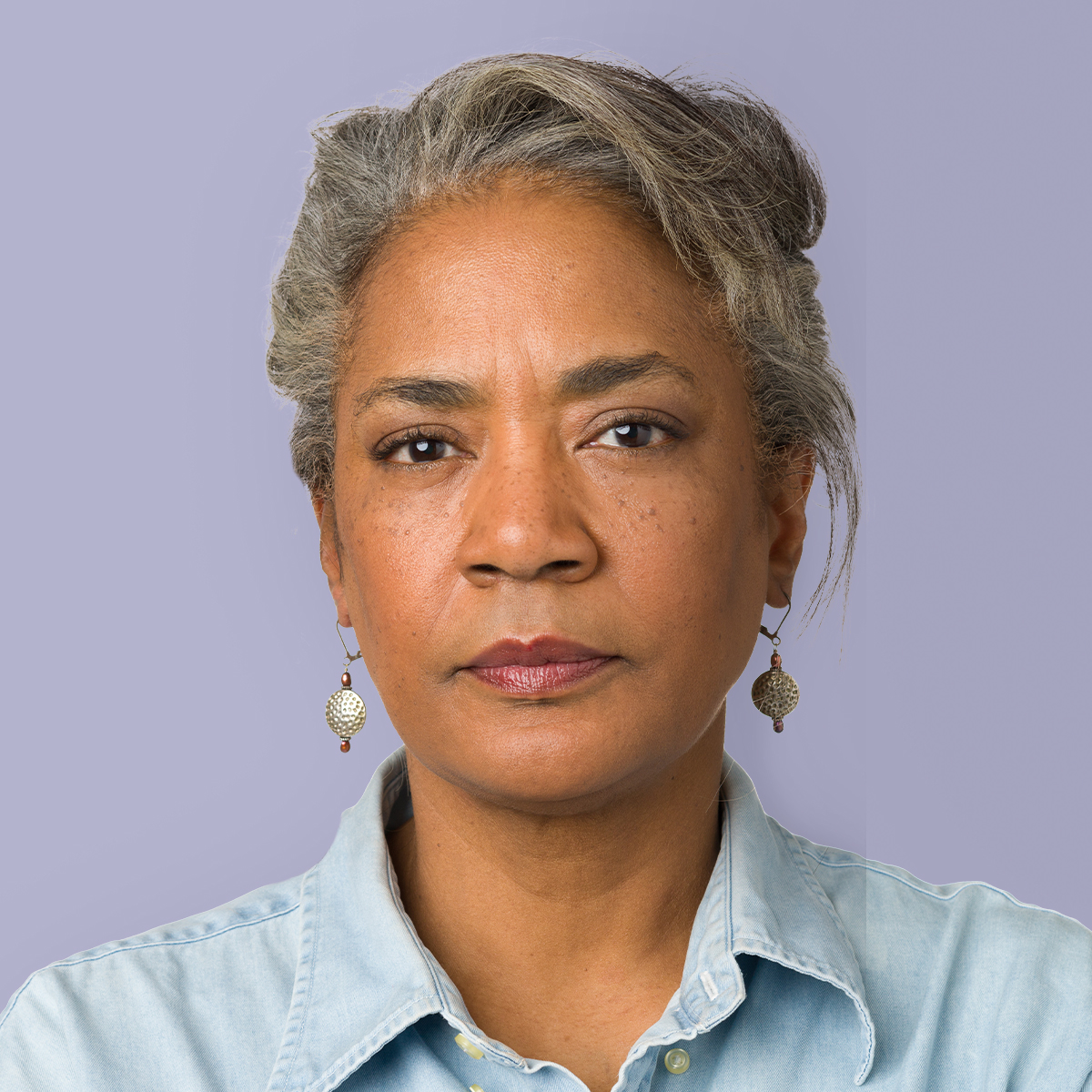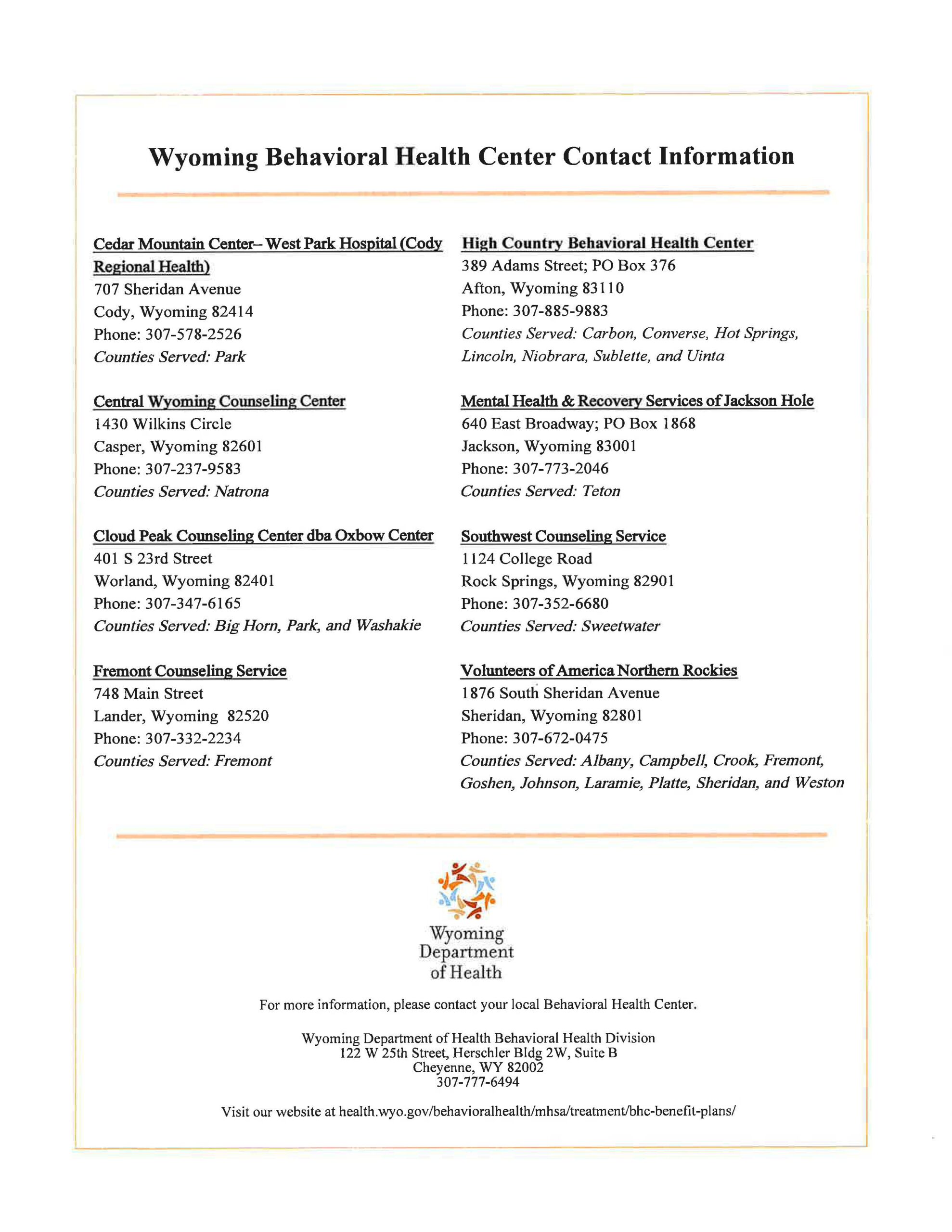On July 1, 2024, The Behavioral Health Redesign Project was implemented, enabling the Behavioral Health Division to contract with Behavioral Health Centers across the State of Wyoming to deliver outpatient and residential mental health and substance use disorder treatment services.
These services are provided through two benefit plans: BHC-Screen and BHC-Full.
Do you need assistance paying for treatment?
Individuals may qualify for a Behavioral Health Center (BHC) Benefit Plan based on financial eligibility or falling into a priority population category.
Priority Populations:
-
State-level justice-involved: Persons who, within the previous six (6) months, have been released or paroled from an institution as defined by W.S. 7-13-401(a)(vi) or who are awaiting admission to evaluation from or have been evaluated by a facility as defined under W.S 7-11-301(a)(ii) and who require continuing treatment for a mental illness or substance use disorder.
-
Non-state level justice involved:
-
Persons who, within the previous six (6) months, have been placed on probation and made subject to an intensive supervision program that includes treatment for a mental illness or a SUD;
-
Persons who within the previous six (6) months have been convicted of or pled nolo contendre to a criminal offense and ordered to enroll in a treatment program for a mental illness or SUD as part of their sentence;
-
Persons on probation, parole or who have been conditionally released, who within the previous six (6) months have been sanctioned under W.S. 7-13-1802(b)(iv) through (vi) and ordered to receive treatment for a mental illness or a SUD;
-
Qualified offenders under W.S. 7-13-1301 through 7-13-1304 who within the previous six (6) months have been ordered to receive treatment for a SUD.
-
-
Families at high risk:
-
Children who have been discharged from an acute psychiatric facility or psychiatric residential treatment facility within the previous six (6) months and their immediate family members as defined by Department of Family Services rules;
-
A child or the parent, legal guardian or another immediate family member, as defined by rule of the department of family services, referred to a behavioral health center by DFS for treatment for a mental illness or substance use disorder and the treatment, is necessary to prevent the removal of the child from the child’s home or prevent the removal of the child or to reunify the child with the family;
-
A child who has been referred to a BHC by a youth crisis shelter, school, primary care provider, licensed therapist or law enforcement officer for treatment for mental illness or SUD that impacts the child’s life.
-
-
Adults with Acute Mental Illness: Persons who are subject to emergency detention, involuntary hospitalization order, or a directed outpatient commitment order or who were released from emergency detention or discharged from an involuntary hospitalization or directed outpatient commitment within the last six (6) months.
-
Adults with Severe Mental Illness:
-
Persons who, based on diagnosis and history, have a substantial probability of being unable to meet their needs for food, shelter, and medical care if they do not receive regular mental health treatment or case management.
-
Vulnerable adult means any person eighteen (18) years of age or older who is unable to manage and take care of himself or his money, assets, or property without assistance as a result of advanced age or physical or mental disability. W.S. 35-20-102(a)(xviii).
-
-
Indigent clients with high needs: Persons who meet the definition of indigent general access and who have a mental illness or SUD that substantially impairs their ability to function in society.
-
Indigent general access clients: Persons whose total household income is not more than two hundred (200%) of the federal poverty level.
BHC Plans - Informational Flyer
The following document provides information about the Behavioral Health Center Benefit (BHC) Plans, how to apply, and covered services.
BHC Plan - Provider Manual
The Behavioral Health Center (BHC) Benefit Plans Provider Manual provides information and guidance to BHC providers, state agencies, and other interested parties regarding the benefit plans developed for state-funded mental health (MH) and substance use disorder (SUD) treatment services in Wyoming. The Behavioral Health Division (BHD) of the Wyoming Department of Health administers these benefit plans.
The benefit plans are not included in the Wyoming Medicaid system, and enrollment of providers is restricted to specific providers contracted with the BHD.
This manual is intended to guide providers in identifying priority populations, meeting service delivery expectations, and submitting claims for services rendered. It is designed to be read and interpreted with federal regulations, state statutes, and administrative procedures. This manual does not supersede federal laws, state statutes, or administrative procedures.


